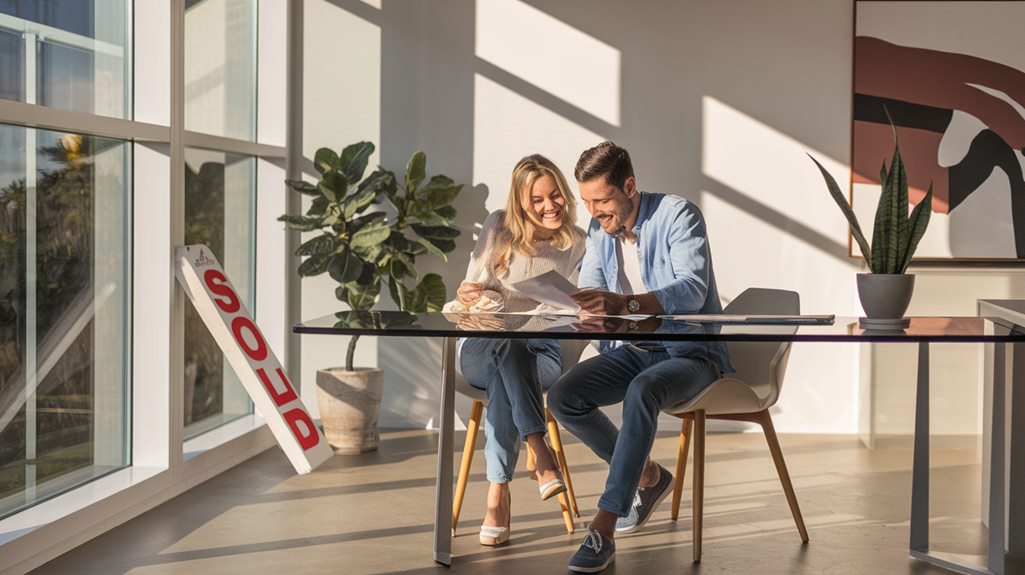Are you buying your first home? That's exciting! First, check how your money is doing. Look at your credit score and make sure you don't have too many debts. It's also good to have a steady job.
Next, make a budget. Think about how much you can spend each month, including all the costs of owning a home.
Then, get pre-approved for a mortgage. This helps you see what kind of loan you can get.
After that, look for neighborhoods that you like. Think about what's nearby, like schools and parks.
It's important to find a good real estate agent who understands what you want. Go visit homes and see what you like.
Don't forget to have a professional check the house to make sure it's safe and sound.
Finally, learn about the closing process. Know what closing costs are and what documents you need to look at.
Take your time to learn about each step and make smart choices!
Ready to start building equity in your own Michigan home? Get your personalized home loan quote today.
Assess Your Financial Health

Before you start looking for a new home, it's really important to check how you're doing with money. First, take a look at your credit score. This number helps banks decide if they can lend you money and what interest rate they'll give you.
Next, make sure you're paying off any debts you have. The less money you owe, the better your credit will be.
Also, it's smart to save money. Make sure you have some extra cash saved up for surprises so they don't mess up your plans.
Check if you have a steady job because banks like to see that you earn the same amount of money regularly when you ask for a mortgage.
Think about what you want to do with your money and when you want to do it. You can use a budget to help you keep track of your spending.
This careful planning will help you buy a home and feel good about being part of your new neighborhood.
Michigan residents, unlock the door to your new home. Request your home loan quote from Treeside Financial today.
Set a Realistic Budget
Making a budget for buying a home is really important. It helps you keep your money safe and not spend too much.
Start by looking at how much money you earn and what you spend each month. You can use simple tools to see where your money goes. These tools can show you where you can save some money.
When you set a budget, think about future costs like fixing things in your new home and paying taxes. Buying a house is more than just a place to live; it's also about being part of a neighborhood that you can afford.
Take your time and feel good about this big step, knowing you have your money under control.
Get Pre-Approved for a Mortgage

Getting pre-approved for a mortgage is an important step when buying a home. It helps you know how much money a bank is ready to lend you.
First, check your credit score. This number affects if you can get a loan and what your interest rate will be. Look at different types of mortgages to find the one that works for you. Compare lenders to make sure you get good loan terms.
When you apply, you'll need to share some financial papers and look at how much debt you have compared to your income. You should also be ready to make a down payment, which is the money you pay upfront. Understand how this amount affects your loan.
Keep track of how long the pre-approval process takes. This will help you know when you can start looking for a home.
Getting pre-approved makes you feel more sure and excited about finding your new home!
Research Neighborhoods
When you're thinking about buying your first home, it's important to look at the schools nearby, even if you don't have kids. Good schools can make homes worth more money.
Check out the parks, stores, and bus stops in the area too. This way, you can find a neighborhood that fits your lifestyle.
Evaluate School Districts
Buying your first home is exciting! If you have kids or want to have them someday, checking out the local schools is very important. Good schools can make a big difference.
Here's how you can look at school districts:
- Check School Ratings: Look at how kids do on tests and other scores.
- Look at the School's Students: Think about how many teachers there are for each student and if kids come from different backgrounds.
- Visit the Schools: Go to the schools to see what they're like and how they feel.
- Talk to People: Join local groups and talk to neighbors to learn more.
Assess Local Amenities
Looking at the neighborhood is just as important as looking at the house. Knowing what's around you can make your life better and help you feel like you belong.
Start by checking out the community services nearby. Are there parks, libraries, or places to play? These spots help people connect and have fun.
Next, think about how you'll get around. Is there public transport or easy highways? This can make it quicker to travel.
Also, look for grocery stores, hospitals, and places to eat. These things make daily life easier and more enjoyable.
Talk to the people who live there. They can tell you what the neighborhood is really like.
Hire a Real Estate Agent

Buying your first home can feel really big and confusing. That's why it's super helpful to find a real estate agent who knows what they're doing.
Here's how to pick a good one:
- Ask for Help: Talk to your friends or family. They can tell you if they know a good agent. You can also look online to see what agents are out there.
- Meet a Few Agents: Set up some meetings. This way, you can see how they work and if you get along with them.
- Check Their License: Make sure the agent is licensed and has helped others find homes before.
- Talk Openly: It's important to feel comfortable talking to your agent. You want to trust them so the whole buying process goes smoothly.
Finding the right agent can make buying your first home a lot easier!
Visit and Evaluate Homes
When you're ready to start looking at homes, it's helpful to make a list of what you really want and what you don't want. This list will help you as you see different houses.
Think about things like where the house is, how big it is, and if the rooms are set up in a way that works for you. Look for things that make you feel at home, like friendly neighbors and parks or stores nearby.
When you visit the houses, ask lots of questions. Try to picture yourself living there and if it feels right for you.
If you find a house you really like, make sure to get a professional to check it out. This is important to find any hidden problems that might change your mind.
Trust your feelings and knowledge to help you find the best place to call home.
Navigate the Closing Process

As you get ready to close on your home, it's important to know what closing costs are. This helps you keep track of your money.
Be sure to look over all the papers carefully to make sure everything is right and that your interests are safe.
Before you finish the deal, take a last look at the house to make sure it's in the shape you expect.
Understanding Closing Costs
Getting through the closing process can feel like putting together a tricky puzzle, especially when it comes to closing costs. It's normal to feel a bit confused about what these costs are, but knowing what to expect can make things easier.
Here's a simple guide to help you:
- Loan Origination Fees: This is the money the lender charges to help set up your loan. Always ask for a clear list of these costs.
- Appraisal and Inspection Fees: These are important to make sure your new home is valued and checked for problems.
- Title Insurance: This helps protect you from any hidden issues that might come from the home's past owners.
- Prepaid Costs: These are costs like homeowner's insurance and property taxes that you pay in advance.
With this guide, you can feel more ready for the closing process!
Reviewing Legal Documents
Once you understand closing costs, it's time to look at the legal papers you need to sign when buying a home. This is very important because it helps you make smart choices and protects your money.
Start by learning some important words that are used in these papers. It helps to make a list of the documents you need so you can keep everything organized.
Here's a simple table to help you:
| Document | What it is for |
|---|---|
| Purchase Agreement | Tells you what the sale is about |
| Title Insurance Policy | Protects you if there are problems with the home's title |
| Closing Disclosure | Shows you the loan details and costs |
| Deed | Proves you own the house |
| Loan Estimate | Tells you how much the loan will cost |
Looking at these papers helps you feel more connected to your new neighborhood. It also gives you confidence as you start your journey in your new home!
Final Walkthrough Checklist
Before you get the keys to your new home, it's really important to take a final look around. This is called a final walkthrough. It helps you make sure everything is just how you want it.
Here's a simple checklist to help you:
- Look for Repairs: Check that all the fixes you talked about are done. Also, look for any new problems.
- Test Things: Make sure all the appliances and systems, like the heater and air conditioner, are working well.
- Check Lights and Faucets: Make sure all the lights and faucets work and that nothing has been taken away.
- Look for Cleanliness: The house should be clean and shouldn't have any trash left by the last owners.
Taking this time will help you feel good about your new home!







